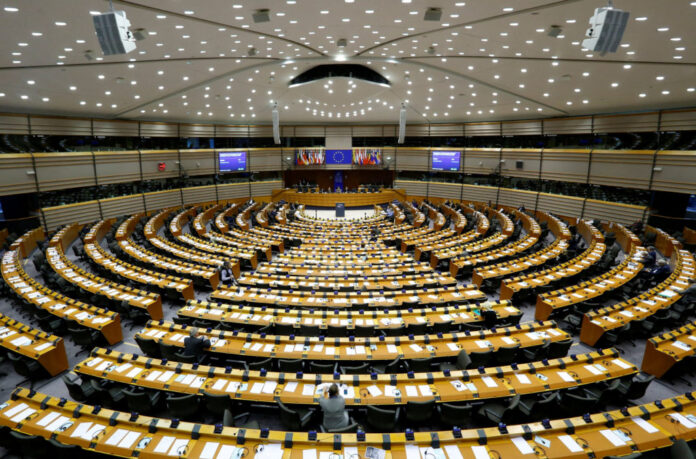· Η γνωμοδότηση του Δικαστηρίου αναφέρει ότι η ΕΕ μπορεί να επικυρώσει τη Σύμβαση χωρίς ομοφωνία στο Συμβούλιο
· Τα κράτη μέλη πρέπει να καταπολεμήσουν την παραπληροφόρηση σχετικά με τη Σύμβαση της Κωνσταντινούπολης και να την εφαρμόσουν πλήρως
· Nα χρηματοδοτηθούν επαρκώς οι οργανώσεις ανθρωπίνων δικαιωμάτων
Η Ευρωπαϊκή Ένωση θα πρέπει να προχωρήσει στην επικύρωση της Σύμβασης για την πρόληψη και την καταπολέμηση της βίας κατά των γυναικών, με βάση τη γνωμοδότηση του ΔΕΕ του 2021. Αυτό αναφέρουν τα μέλη των επιτροπών Δικαιωμάτων των Γυναικών και Ισότητας των Φύλων (FEMM) και η Πολιτικών Ελευθεριών, Δικαιοσύνης και Εσωτερικών Υποθέσεων (LIBE) σε έκθεση που ενέκριναν την Τετάρτη. Στο κείμενο υπογραμμίζουν ότι η Σύμβαση της Κωνσταντινούπολης παραμένει το διεθνές πρότυπο για την εξάλειψη της έμφυλης βίας, καταδικάζουν τις προσπάθειες ορισμένων κρατών μελών της ΕΕ να ανακαλέσουν ήδη ισχύοντα μέτρα και τα καλούν εφαρμόσουν πλήρως τη Σύμβαση.
Επόμενα βήματα
Η ολομέλεια του ΕΚ πρόκειται να ψηφίσει το κείμενο κατά τη σύνοδο της ολομέλειας στις 13-16 Φεβρουαρίου.
Βρείτε παρακάτω την ανακοίνωση Τύπου στα αγγλικά:
Istanbul Convention: do not delay EU accession any longer
•Court of Justice’s Opinion states that the EU can ratify the Convention without unanimity in the Council
•Member states must fight disinformation about the Istanbul Convention and fully implement it
•Fund human rights organisations sufficiently
The European Union should proceed with ratifying the convention on preventing and combating violence against women, based on the ECJ opinion of 2021.
The text, adopted by 68 in favour, 13 against and 3 abstentions, highlights that the Istanbul Convention remains the international standard and a key tool to eradicate gender-based violence, including domestic violence. MEPs strongly condemn attempts in some member states to revoke measures already taken in applying the Istanbul Convention and call on them to fully implement it.
Condemning the backlash against gender equality, women’s rights and the Istanbul Convention in some member states, for example in Poland, MEPs call on national authorities to fight against disinformation and raise awareness to dispel all doubt about the Convention and its benefits for society as a whole.
Six years after the EU signed the Convention, it has still not ratified it, due to the refusal of a few member states in the Council. However, the EU Court of Justice’s Opinion of 6 October 2021, following up on Parliament’s request, states that the Council can proceed with ratifying the Istanbul Convention by the European Union without a prior common agreement between the member states. The EU’s accession to the Istanbul Convention does not exempt member states from national ratification, say MEPs, who urge the remaining six member states to ratify the Convention without delay.
Concrete proposals for implementation measures
Criminal justice should only be one part of a comprehensive and integrated response to gender-based violence, MEPs say, encompassing prevention, protection, and prosecution. Member states should ensure gender-sensitive training, procedures and guidelines, as well as specialist support and protection measures with a victim-centred approach for all professionals involved, including law enforcement agencies, the judiciary and public prosecutors.
The Istanbul Convention was crucial during the COVID-19 pandemic in helping EU countries face the alarming increase of gender-based violence, MEPs say. Recognising the pivotal role of women’s and other human rights organisations, including organisations working for minority groups’ rights, in preventing and combating gender-based violence, and their efforts to provide assistance to victims, MEPs call on the member states and the Commission to support them by providing sufficient, reliable, sustainable and long-term financial resources.
Quotes
Arba Kokalari (EPP, Sweden), rapporteur for the Women’s Rights and Gender Equality Committee, said: “I’m glad that the report received such incredible support in the committee today. After almost ten years of pushing from the European Parliament, now there is a window of opportunity to tackle violence against women that affects as many as one third of all women in Europe.”
Łukasz Kohut (S&D, Poland) rapporteur for the Civil Liberties, Justice and Home Affairs Committee said: “The reality in many homes where violence is happening must change soon! The Convention imposes a concrete obligation on signatories to combat violence against women and domestic violence. Our report is a strong signal supporting the Swedish Presidency’s efforts for the EU to accede to the Istanbul Convention, but also a call to provide financial resources to NGOs dealing with women’s rights was included in the report. Women’s rights should be excluded from political conflict.”
Next steps
The full House is set to vote on the text during the 13-16 February plenary session.
Background
One in three women in the EU, around 62 million women, has experienced physical and/or sexual violence and more than half of women (55%) in the EU have experienced sexual harassment at least once since the age of 15. All member states have already signed the Istanbul Convention, but Bulgaria, Czechia, Hungary, Latvia, Lithuania and Slovakia have not yet ratified it.














